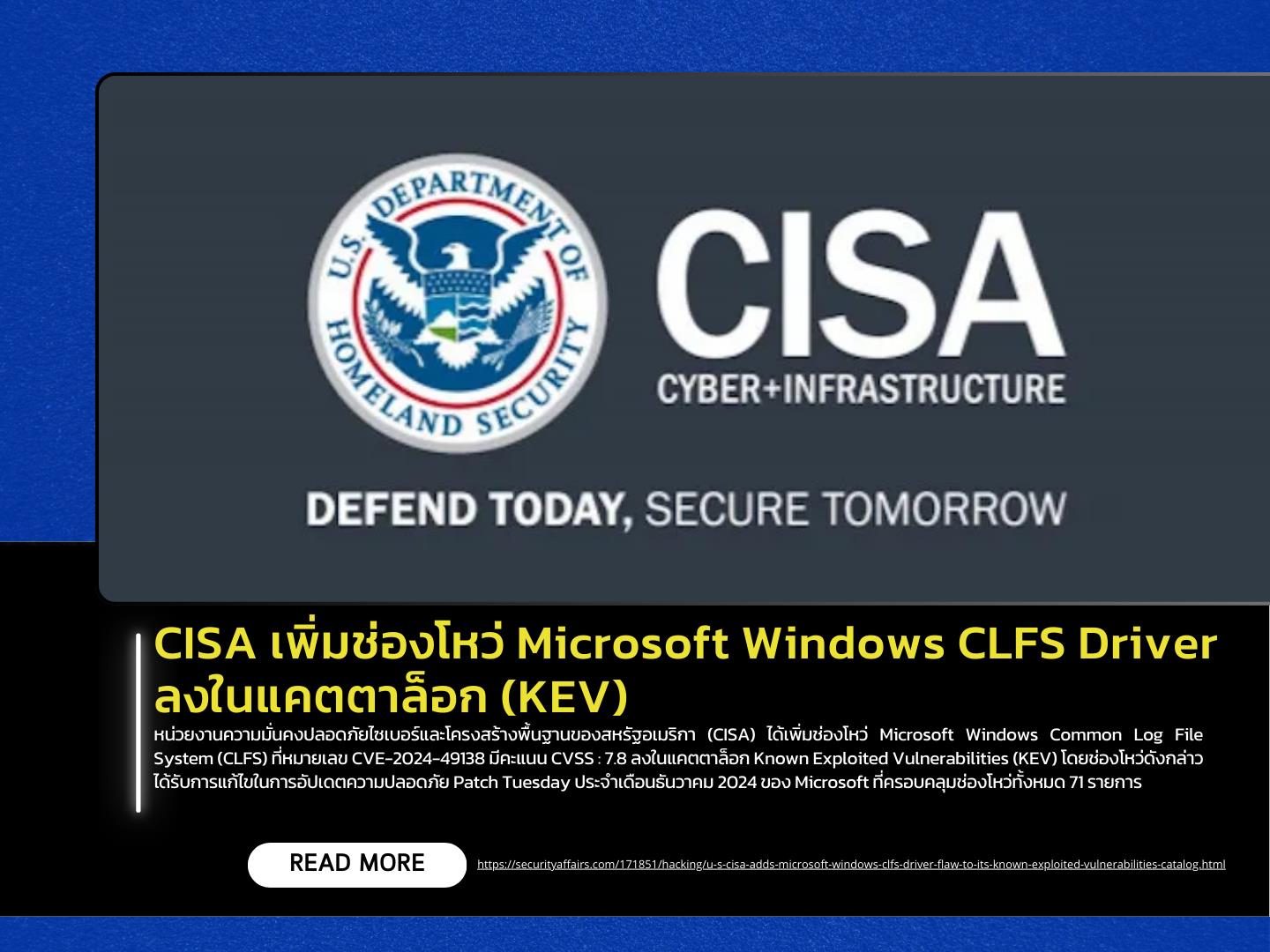
CISA Flags Exploitation Of Windows CLFS Privilege Flaw

The U. S. Cybersecurity and Infrastructure Security Agency has designated CVE-2021-43226, a privilege-escalation vulnerability in Microsoft's Common Log File System driver, as actively exploited and added it to its Known Exploited Vulnerabilities catalog.
The flaw allows a local, authenticated user to bypass security controls and elevate privileges to the SYSTEM level-a shift that can lead to full system compromise. Microsoft rates the vulnerability with a CVSS 3.1 base score of 7.8.
CISA's action is prompted by evidence of exploitation in the wild, which triggers a requirement for federal agencies to mitigate or patch the vulnerability by 27 October 2025 under Binding Operational Directive 22-01.
This is the first time C-level federal agencies have been instructed to act on this particular CVE.
-
Exploitation scenarios require the attacker to already hold standard user privileges and have local access. From there, crafted input via the CLFS driver's memory management routines may trigger buffer overflow or improper validation paths, leading to elevation to SYSTEM privileges.
Multiple Windows platforms are vulnerable, including Windows 10, Windows 11, and Windows Server variants. Detection is challenging because attacker activity may mimic legitimate driver operations. Observables, however, include anomalous service or driver loads, token manipulations, or file creation involving CLFS components.
Microsoft's own advisories confirm that input validation weaknesses within the CLFS driver enable attacker-controlled craft of malformed log file data to exploit the vulnerability.
Security analysts warn that threat actors could leverage this flaw post-compromise-i. e. after gaining initial foothold via phishing or malware-to move laterally or install ransomware with elevated rights. Some managed security vendors rate the risk as“active exploitation” and urge organisations to treat it as a high priority.
-
CISA's decision to add CVE-2021-43226 to the KEV catalog came on 6 October 2025, along with six other vulnerabilities. Across its public catalog, CISA confirms that CVE-2021-43226 now mandates mitigation for U. S. federal and critical infrastructure entities.
The timeline places the vulnerability's addition firmly in October 2025. Past documentation of CVE-2021-43226 by NVD shows the CVSS, description, and Microsoft attribution, as well as highlighting that it was added to the KEV list only as of 6 October 2025.
Some incident response and cybersecurity firms had anticipated an uptick in exploitation of this CLFS defect owing to emerging exploit code in underground forums and PoC proofs being circulated. Organisations caught off guard face elevated exposure, especially in enterprise, server, and domain environments where control elevation is more damaging.
-
Mitigation options include applying Microsoft's security updates, employing application control, enforcing least-privilege configurations, and instrumenting EDR/telemetry to alert on anomalous driver or token activity. For organisations unable to patch immediately, isolating compromised systems and segmenting access paths serve as interim risk reduction.
Some security teams are also monitoring logs for anomalous Event IDs like 4656 or 4658 related to file system access, especially involving clfs. sys and related drivers. Threat hunting rules for CLFS BLF file creation and inspecting dllhost. exe invocations are also under deployment in certain defender communities.
Notice an issue? Arabian Post strives to deliver the most accurate and reliable information to its readers. If you believe you have identified an error or inconsistency in this article, please don't hesitate to contact our editorial team at editor[at]thearabianpost[dot]com . We are committed to promptly addressing any concerns and ensuring the highest level of journalistic integrity. Legal Disclaimer:
MENAFN provides the
information “as is” without warranty of any kind. We do not accept
any responsibility or liability for the accuracy, content, images,
videos, licenses, completeness, legality, or reliability of the information
contained in this article. If you have any complaints or copyright
issues related to this article, kindly contact the provider above.
Most popular stories
Market Research

- Pepeto Highlights $6.8M Presale Amid Ethereum's Price Moves And Opportunities
- Codego Launches Whitelabel Devices Bringing Tokens Into Daily Life
- Zeni.Ai Launches First AI-Powered Rewards Business Debit Card
- LYS Labs Moves Beyond Data And Aims To Become The Operating System For Automated Global Finance
- Whale.Io Launches Battlepass Season 3, Featuring $77,000 In Crypto Casino Rewards
- Ceffu Secures Full VASP Operating License From Dubai's VARA



















Comments
No comment